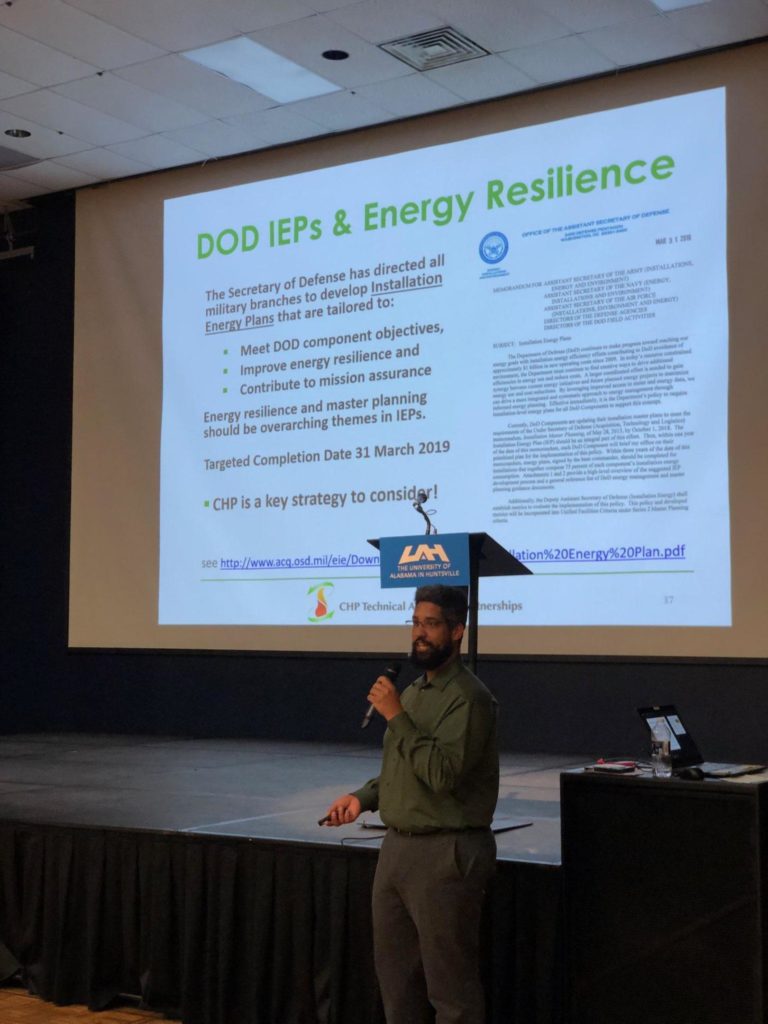NCCETC Delivers Training on CHP at Army Resource Efficiency Manager Workshop

Last month, NC Clean Energy Technology Center (NCCETC) Clean Power & Industrial Efficiency (CPIE) team members provided guidance and training at the U.S. Army Corps of Engineers’ fifth Resource Efficiency Manager Workshop.
The workshop, hosted in Huntsville, Al., connected Army Resource Efficiency Managers (REMs) and energy experts from a variety of backgrounds to help REMs enhance their installation energy programs. The Center’s involvement at the workshop focused on support available through the U.S. Department of Energy (DOE) Southeast Combined Heat and Power (CHP) Technical Assistance Partnership (TAP). The Southeast CHP TAP, managed by the NCCETC, provides education and technical assistance to help energy end-users consider the benefits of combined heat and power.
The national Resource Efficiency Manager (REM) Program increases Army installation energy program effectiveness by identifying programs, practices and other opportunities to reduce energy and water costs through a contracted subject matter expert. Army REMs work to support installation energy efforts as well as overarching enterprise goals. They develop site energy programs to secure resources for sustainability and renewable energy assets, imparting on-site knowledge and understanding to facilitate development and execution of energy goals.
Isaac Panzarella, NCCETC Assistant Director for Technical Services, and Ted Spencer, NCCETC Project Engineer, attended the workshop to present and provide guidance as energy experts to REMs.
“There were a lot of good conversations and discussions,” Spencer said. “We were able to spread some knowledge and give energy managers something to think about with our viable solutions to keep their bases running.
“It was a really good workshop overall. Our session was well attended, and it was very well received information,” Panzarella said. “You really can’t beat seeing people one on one, starting to develop these relationships. We learned a lot about different things these REMs are doing out in the field to help the Army reduce its energy use and become more resilient.”
Panzarella said that in his and Spencer’s presentation, they tried to speak to the current needs of the Army to develop energy resilience.
“It’s an interesting time and place right now,” Spencer said. “Energy managers – for all of the various facilities for most of the Department of Defense – are trying to figure out how to make their bases more secure, more reliable, and better able to stand up against disasters, which the Pentagon has deemed a large threat to national security.”
Panzarella and Spencer also introduced the new Department of Energy (DOE) Combined Heat & Power (CHP) resource, called the eCATALOG. The eCATALOG is an online resource where DOE works with CHP vendors to provide packaged CHP systems. By packaging CHP systems, it helps to ensure the systems are pre-engineer tested and ready to install, reducing the time and complexity of installation on site.
“Before this point, CHP systems were engineered from scratch and required a lot of engineering, and that was a barrier to deployment,” Panzarella said. “By developing these packages, they’re able to provide more certainty, better prediction of costs. Through the eCATALOG, you can find systems that meet your requirements and get quotes from several vendors and be able to work that into your project and budget. That’s something we hope the management of the Army will support launching.”
In addition to dispensing knowledge, Panzarella and Spencer said they learned about myriad other programs and resources at the workshop.
Panzarella said he learned from Schweitzer Engineering Lab, which is doing work for the Army to develop technology to combine the Army’s multiple emergency backup generators in the field to the grid. The Lab’s engine management system helps ensure the system runs as efficiently as possible and has also reduced maintenance on systems.
Spencer said he learned a lot about how Puerto Rico is adapting post-hurricane, as well as what they’re doing to prevent what happened from ever happening again.
Panzarella said he and Spencer are currently in the follow-up stage and hope to share their up-to-date information and resources to support REMs one-on-one. They both agreed that they hope to attend the next REM Program workshop.
“We are able to make some good contacts,” Panzarella said. “Hopefully, we’ll provide assistance to help the REMs and their installations. Engagements like this really help our (CPIE) program to have a bigger impact.”
“I got to hear a variety of voices – what their needs are and what they’re seeing – and how we can help meet their needs in the future,” Spencer said.
Huntsville Center hosts an REM workshop annually. Contact the REM team by calling (256) 895-1322 and learn more here. Learn more about the Clean Power & Industrial Efficiency (CPIE) team at NCCETC here, and contact Isaac Panzarella at ipanzar@ncsu.edu or 919-515-0354.